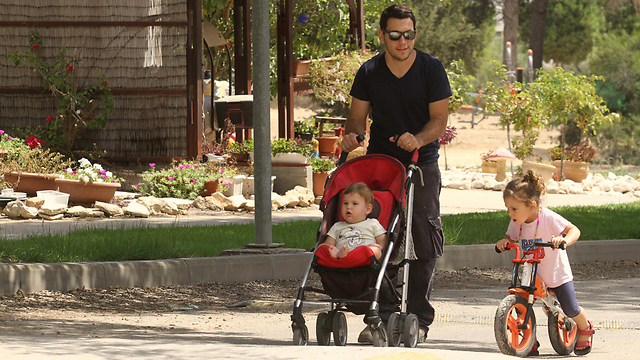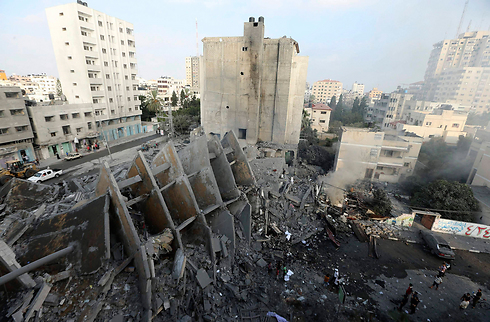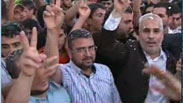
Quiet night in southern Israel as Gaza ceasefire holds
Despite ceasefire, residents of south express anger and criticism of government, reluctance to return home; 'I will not return and risk my kids' lives until Hamas' is disarmed,' locals say after being pelted with over 4,500 rockets in seven week conflict.
Even though rocket attacks continued until the very last moment, the open-ended ceasefire deal reached between Israel and Hamas which came into effect Tuesday evening held throughout the night and Wednesday morning.
Though residents can now return to their homes, most residents seem reluctant to do so, saying they have little faith in either the government or the truce.
Merav Cohen, a resident of Ein Hashlosha, has yet to return to her kibbutz, which was mostly abandoned during the war. "Yesterday we were told not to return home by the head of our regional council, whom we trust. We don't believe the government, maybe in Netanyahu's house in Caesarea there is peace, but here there is no peace.
Related stories:
- Bennett calls for vote on Gaza ceasefire, says cabinet opposes deal
- Report: Hamas, Islamic Jihad accept Egyptian ceasefire draft
- The road to a ceasefire is via Rafah
"I cannot understand how Netnayahu can tell thousands of people to return home without discussing the matter with his cabinet. My kids will not go back to school, this ceasefire is nothing and I will not risk my children for it. As long as Hamas is armed I will not return home."
The demand that the Strip be demilitarized was one of Israel's central demands, however, as part of the ceasefire agreement, it joins a long list of issues set to be discussed at a later date. Tuesday's ceasefire was eleventh attempt to end the conflict, and many previous attempts ended abruptly with renewed rocket fire on the south.
"Things are just as they were 50 days ago (before the fighting started) but now we have casualties," Cohen lamented.
Osnat Tanuri, whose brother was wounded by a mortar Tuesday before the ceasefire came into effect, said "we except the government to take of the situation here, but we no longer believe them. We have learned to understand that a ceasefire is only a temporary thing. Tomorrow Hamas can decide to attack us and then we'll be like sitting ducks, everyone here is exhausted.
Arnon Avnei, also a resident Kibbuz Nirim said local residents were organizing a campaign calling for the government to stop making promises regarding what Israel will do if fighting starts again. "There shouldn't be a next round."
Under fire
The rocket alerts in the south continued for at least 15 minutes after the truce came into effect at 7 pm Tuesday evening, and two men severely wounded by mortar fire Tuesday succumbed to their wounds and died after the deal came into effect.
In the past day of fighting, over 182 rockets and mortars were fired at Israel, 143 of them falling in open areas, fiving hitting in residential areas, while 27 were intercepted. Since the collapse of a ceasefire last week, over 1,045 rockets and mortars were fired at Israel, 141 of which were intercepted.
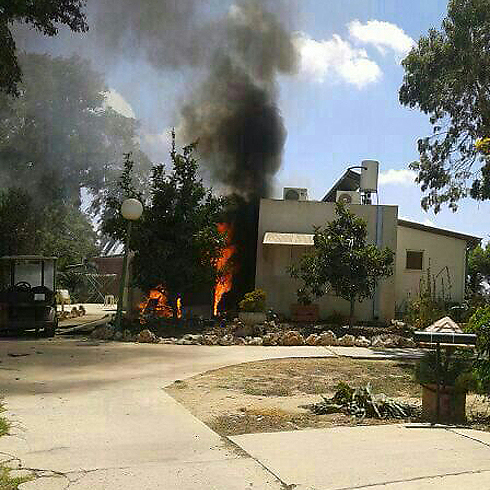
Since the beginning of the operation on July 8th, 4,564 rockets and mortars were fired at Israel from Gaza Strip. Most proved to be harmless when 3,641 exploded in Israel, with only 224 falling in residential areas, and the remaining falling in open areas; Iron Dome intercepted over 735.
In the meantime, the IDF attacked 5,263 targets across the Gaza Strip.
About an hour before the cease-fire, 12 mortar shells hit an Israeli communal farm near Gaza, killing two Israelis and wounding seven other people, two of them critically, the IDF said.
In Gaza, an Israeli airstrike minutes before the start of the cease-fire toppled a five-story building in the town of Beit Lahiya, witnesses said. Twelve Palestinians, including two children, were killed in several Israeli airstrikes before the truce took hold, Gaza police said.
In Gaza City, a 20-year-old woman was killed and several dozen people were wounded by celebratory gunfire after the truce was announced.
In recent days, Israel had stepped up its pressure on Hamas, toppling five towers containing offices, apartments and shops since Saturday. Two of those buildings were brought down in airstrikes early Tuesday that destroyed dozens of apartments and shops.
Hamas has emerged from the war badly battered. Just one-third of its initial rocket arsenal of 10,000 remains, according to Israel and the Islamic group's network of attack tunnels under the border with Israel has been mostly destroyed.
Despite its victory celebrations Tuesday, Hamas failed to force an end to the Gaza blockade, imposed by Israel and Egypt after the Islamic militants seized the seaside strip in 2007.
Under the restrictions, virtually all of Gaza's 1.8 million people cannot trade or travel. Only a few thousand are able to leave the coastal territory every month.
The cease-fire deal makes no mention of ending the ban on exports from Gaza or significantly easing travel.
Palestinian President Mahmoud Abbas, a long-time rival of Hamas, will likely play a key role in any new border deal for Gaza. Abbas, who lost Gaza to Hamas in 2007, is expected to regain a foothold there under any Egyptian-brokered agreement.
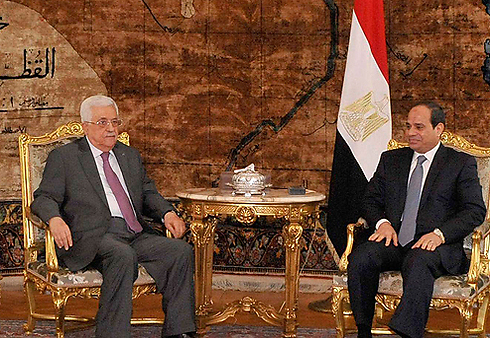
Forces loyal to Abbas would be posted at Gaza's crossings to allay fears by Israel and Egypt about renewed attempts by Hamas to smuggle weapons into the territory. Israel is also concerned that material for reconstruction would be diverted by Hamas for military purposes.
In a televised address Tuesday evening, Abbas said the end of the war underscored the need to find a permanent solution to the conflict with Israel.
"What's next? Gaza has been subjected to three wars. Shall we expect another war in a year or two? Until when will this issue be without a solution?" he said.
Aides have said Abbas plans to ask the UN Security Council to demand Israel's withdrawal from all lands captured in the 1967 Mideast war to make way for an independent Palestinian state.
Abbas alluded to the plan in his speech.
"Today I'm going to give the Palestinian leadership my vision for a solution and after that we will continue consultations with the international community," he said. "This vision must be clear and well-defined and we are not going to an open-ended negotiation."
Yoav Zitun, Roi Kais, Attila Somfalvi and the Assocaited Press contributed to this report










